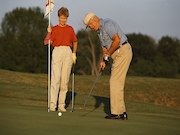In adults aged 70 to 95, going out more often is linked to higher survival rates versus rarely leaving
THURSDAY, Nov. 30, 2017 (HealthDay News) — Elderly individuals who frequently leave the house have a lower risk of mortality, according to a study published online Nov. 22 in the Journal of the American Geriatrics Society.
Jeremy M. Jacobs, M.B.B.S., from Hebrew University-Hadassah Medical School in Israel, and colleagues prospectively followed community-dwelling seniors aged 70 (n = 593), 78 (n = 973), 85 (n = 1,164), and 90 (n = 645) in 1990, 1998, 2005, and 2010, respectively, to assess their frequency of leaving the house and determine its association with mortality. Frequency was characterized as daily (six to seven times per week), often (two to five times per week), or rarely (one or fewer times per week).
The researchers found that at ages 70, 78, 85, and 90, the frequency of going out daily was 87, 80.6, 65.6, and 48.4 percent, respectively, while the frequency of leaving rarely was rarely was 6.6, 10, 17, and 40.3 percent, respectively. Going out less frequently was associated with negative social, functional, and medical characteristics. Those leaving rarely had the lowest survival rates, while those going out daily had the highest survival rates. Also, unadjusted mortality hazard ratios were lowest among individuals leaving daily, and this association remained significant after adjustment for social, functional, and medical covariates.
“In community-dwelling elderly adults aged 70 to 90, leaving the house daily was associated with lower mortality risk, independent of social, functional, or medical status,” conclude the authors.
Copyright © 2017 HealthDay. All rights reserved.








